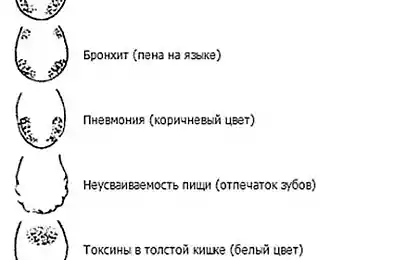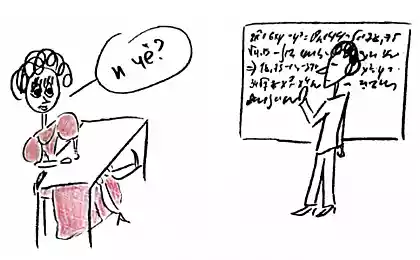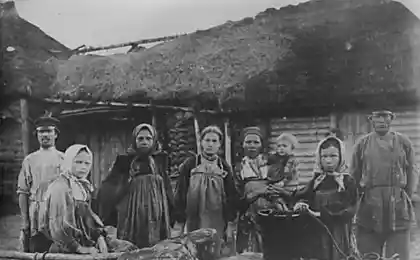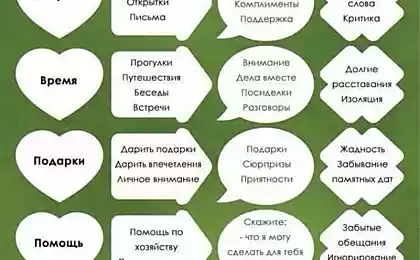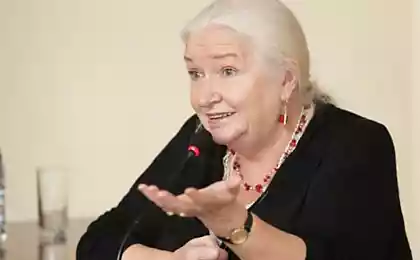579
10 expressions about the origin and meaning of which many people have never thought
"Not at home", "Places not so remote", "useless scrap of Paper" — all these and many other rather strange expression people use in their speech, sometimes without thinking about their true meaning.
We decided to find out how appeared in our language these expressions.
1. "Sly"

"Sape" = "hoe".
Translated from the French word "sape" means "hoe". In the XVI-XIX centuries this term referred to the way of digging a tunnel or trench, which served for the approximation to be strengthened. Initially the expression "sly" meant to undermine, today, this expression means "do something quickly".
2. To suffer "*Jernej"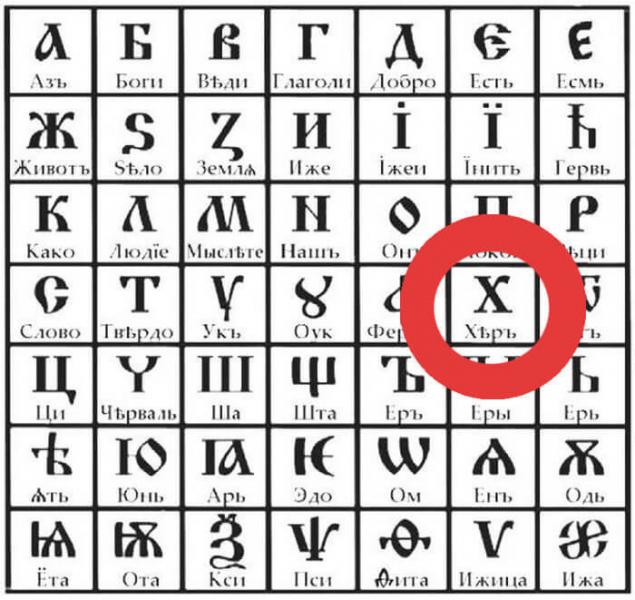
Russian alphabet of the 15th century.
No, it's not offensive! The fact that the word "*er" acquired obscene painting recently, configures, and philosophical speculation that all prohibitions are suspended. Suffice it to recall in "the Brothers Karamazov" Dostoevsky: "And mushrooms? — suddenly asked Ferapont, pronouncing the "p" is aspirated almost like a dick." And there is no doubt that nothing wrong with the classic in mind not had 150 years ago the so-called aspirate the letter "h" in Church Slavonic alphabet. Just for you!
Disappeared this letter of primers after the reform of 1918, and the word was in spoken language. And since the object which it signified was not, they became known as the famous "word of three letters". And stuck the obscene value for a harmless word.
The irony of the situation lies in the fact that the origin of the name of the disgraced letters was initially quite divine — the word "cherub".
Indecent sounding has got the word "*ernya", which from a philological point of view is not derived from "bleep". This is actually the name of the hernia from the Latin for "hernia". In the nineteenth century, such a diagnosis doctors often put the rich bourgeois kids who never wanted to serve in the army. The peasants, as a rule, money for such a diagnosis is not enough. We can say that in those days "*Jernej" suffered a half-Russian.
3. Sidekick

Sidekick.
In this case everything is obvious. "Bosom friend" called someone, it was "pour the Adam's Apple", i.e. mentally to drink.
4. The useless scrap of paper

N. V. Nevrev "Metropolitan Philip and Malyuta Skuratov". 1898
Shary – historical personality and very well known. This refers to the Metropolitan of Moscow Philip the Second, who was the head of the Russian Orthodox Church in 1566-1568 years. Man he, apparently, was shortsighted, and forgetting about their main duty "earnestly to give to Caesar what is Caesar's", quarreled with Tsar Ivan the Terrible. And all because Philip began to expose the atrocities of the king, telling how many people he burnt, poisoned, tortured and tortured. The king in turn called mitropolitul accusatory proceedings "useless scrap of Paper", made a vow that Shary is lying and imprisoned him in a monastery. And there's his and killed the hired killer.
5. "Last Chinese warning"

Empty Chinese threats.
The origin of this expression should know those who remember the 1960s. at that time the whole world watched the standoff between the US and China. In 1958, China was troubled by the fact that America supported Taiwan, and published a note of protest, which was called "final warning". Then the world froze in anticipation of the Third world.
But when over the next seven years, China issued under the same title 400 of the same music, the world would shake with laughter. Fortunately, no further threats to China did not go, and Taiwan managed to maintain its independence, which China did not recognize until now. Thus, under the "last Chinese warning" understand empty threats, for which no action will follow.
6. "Casting pearls before swine"
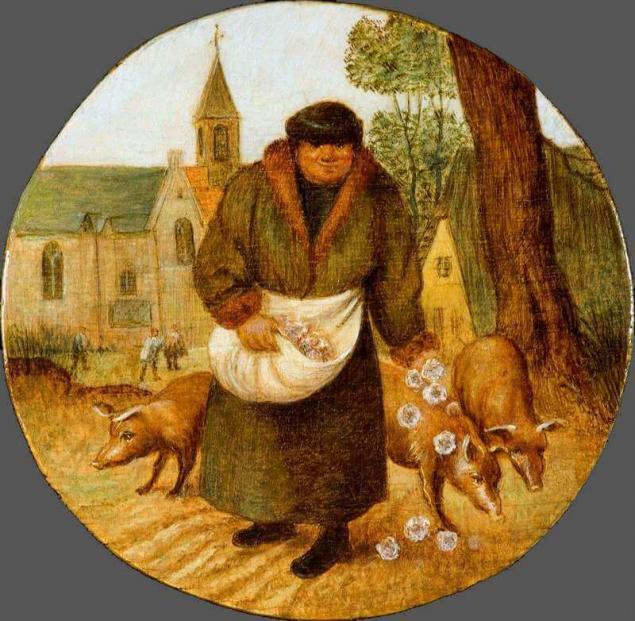
And do not throw your pearls before swine...
These are the words of the sermon on the mount Jesus Christ: "do Not give what is Holy to dogs, neither throw your pearls before swine, lest they trample them under their feet, and, turning, rend you." "The Bible Matt. 7:6" / Synodal translation, 1816-1862 G. of Course, with pearls, this phrase sounds more logical, and the beading is easy to explain – so early in Russia called pearls.
7. Woman with a twist

Woman with a twist?
This way the Russian language gave Leo Tolstoy. In his drama "the Living corpse" one hero in the conversation says to the other: "My wife is the perfect woman was... But what do you say? No raisins, you know the brew the flavor? — didn't play to our lives."
8. "Places not so remote"

Karelia — places not so remote.
In the "penal code" of 1845 all the links have been separated into "distant" and "not so remote". To the "distant" took Sakhalin and the Siberian province, and to the "not so distant" — Karelia, Vologda, Arkhangelsk region and some other places, just a few days away from St. Petersburg. In the second half of the XIX century, the turnover of writers used to refer to the links.
9. To sharpen lyasy

Concrete balyasy.
Fritters or balyasy – the so-called chiseled shaped columns at the porch railing. First, the expression "to sharpen fritters" understood the maintenance of the delicate and intricate conversation. But craftsmen to conduct such a conversation was a bit, so over time this expression came to mean idle chatter.
Also interesting: What is the meaning of the main Russian insults
Very curious. Russian catch phrase: the secret meaning
10. "Not at ease"

"Not at ease"
This expression takes its roots from the French "phrase n'être pas dans son assiette". However, the latter word not only means "plate", but also "mood state".
It was rumored that in the early nineteenth century some pseudo-translator translated from some little pieces "dude, you're not in the spirit of" how "you're not at ease". Not, passed on this marvelous hat. Griboyedov. He put it in the mouth of Andrew: "my Dear! You're not at ease. Off road need sleep". So, with a light hand classic phrase has taken root in the Russian language.published
Author: Alexey Zheleznov
Source: grimnir74.livejournal.com/7469923.html
We decided to find out how appeared in our language these expressions.
1. "Sly"

"Sape" = "hoe".
Translated from the French word "sape" means "hoe". In the XVI-XIX centuries this term referred to the way of digging a tunnel or trench, which served for the approximation to be strengthened. Initially the expression "sly" meant to undermine, today, this expression means "do something quickly".
2. To suffer "*Jernej"

Russian alphabet of the 15th century.
No, it's not offensive! The fact that the word "*er" acquired obscene painting recently, configures, and philosophical speculation that all prohibitions are suspended. Suffice it to recall in "the Brothers Karamazov" Dostoevsky: "And mushrooms? — suddenly asked Ferapont, pronouncing the "p" is aspirated almost like a dick." And there is no doubt that nothing wrong with the classic in mind not had 150 years ago the so-called aspirate the letter "h" in Church Slavonic alphabet. Just for you!
Disappeared this letter of primers after the reform of 1918, and the word was in spoken language. And since the object which it signified was not, they became known as the famous "word of three letters". And stuck the obscene value for a harmless word.
The irony of the situation lies in the fact that the origin of the name of the disgraced letters was initially quite divine — the word "cherub".
Indecent sounding has got the word "*ernya", which from a philological point of view is not derived from "bleep". This is actually the name of the hernia from the Latin for "hernia". In the nineteenth century, such a diagnosis doctors often put the rich bourgeois kids who never wanted to serve in the army. The peasants, as a rule, money for such a diagnosis is not enough. We can say that in those days "*Jernej" suffered a half-Russian.
3. Sidekick

Sidekick.
In this case everything is obvious. "Bosom friend" called someone, it was "pour the Adam's Apple", i.e. mentally to drink.
4. The useless scrap of paper

N. V. Nevrev "Metropolitan Philip and Malyuta Skuratov". 1898
Shary – historical personality and very well known. This refers to the Metropolitan of Moscow Philip the Second, who was the head of the Russian Orthodox Church in 1566-1568 years. Man he, apparently, was shortsighted, and forgetting about their main duty "earnestly to give to Caesar what is Caesar's", quarreled with Tsar Ivan the Terrible. And all because Philip began to expose the atrocities of the king, telling how many people he burnt, poisoned, tortured and tortured. The king in turn called mitropolitul accusatory proceedings "useless scrap of Paper", made a vow that Shary is lying and imprisoned him in a monastery. And there's his and killed the hired killer.
5. "Last Chinese warning"

Empty Chinese threats.
The origin of this expression should know those who remember the 1960s. at that time the whole world watched the standoff between the US and China. In 1958, China was troubled by the fact that America supported Taiwan, and published a note of protest, which was called "final warning". Then the world froze in anticipation of the Third world.
But when over the next seven years, China issued under the same title 400 of the same music, the world would shake with laughter. Fortunately, no further threats to China did not go, and Taiwan managed to maintain its independence, which China did not recognize until now. Thus, under the "last Chinese warning" understand empty threats, for which no action will follow.
6. "Casting pearls before swine"

And do not throw your pearls before swine...
These are the words of the sermon on the mount Jesus Christ: "do Not give what is Holy to dogs, neither throw your pearls before swine, lest they trample them under their feet, and, turning, rend you." "The Bible Matt. 7:6" / Synodal translation, 1816-1862 G. of Course, with pearls, this phrase sounds more logical, and the beading is easy to explain – so early in Russia called pearls.
7. Woman with a twist

Woman with a twist?
This way the Russian language gave Leo Tolstoy. In his drama "the Living corpse" one hero in the conversation says to the other: "My wife is the perfect woman was... But what do you say? No raisins, you know the brew the flavor? — didn't play to our lives."
8. "Places not so remote"

Karelia — places not so remote.
In the "penal code" of 1845 all the links have been separated into "distant" and "not so remote". To the "distant" took Sakhalin and the Siberian province, and to the "not so distant" — Karelia, Vologda, Arkhangelsk region and some other places, just a few days away from St. Petersburg. In the second half of the XIX century, the turnover of writers used to refer to the links.
9. To sharpen lyasy

Concrete balyasy.
Fritters or balyasy – the so-called chiseled shaped columns at the porch railing. First, the expression "to sharpen fritters" understood the maintenance of the delicate and intricate conversation. But craftsmen to conduct such a conversation was a bit, so over time this expression came to mean idle chatter.
Also interesting: What is the meaning of the main Russian insults
Very curious. Russian catch phrase: the secret meaning
10. "Not at ease"

"Not at ease"
This expression takes its roots from the French "phrase n'être pas dans son assiette". However, the latter word not only means "plate", but also "mood state".
It was rumored that in the early nineteenth century some pseudo-translator translated from some little pieces "dude, you're not in the spirit of" how "you're not at ease". Not, passed on this marvelous hat. Griboyedov. He put it in the mouth of Andrew: "my Dear! You're not at ease. Off road need sleep". So, with a light hand classic phrase has taken root in the Russian language.published
Author: Alexey Zheleznov
Source: grimnir74.livejournal.com/7469923.html












